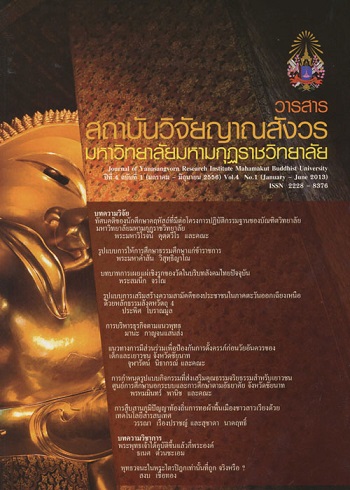Patterns of Dhammasueksa Management for Government Officials
Main Article Content
Abstract
The aims of this thesis were : 1) To study the patterns of Dhammasueksa management for government officials, 2) To compare the opinions of the government officials towards Dhammasueksa management, 3) To study the problems and suggestions in Dhammasueksa management, and 4) To present a model of Dhammasueksa management. The outcomes of the study were found that: 1) The level of Dhammasueksa management for the government officials was high in overall. The highest level was in the output and the lowest was in the process in Dhammasueksa management. 2) The officials with different sex had significantly different opinion on Dhammasueksa management at a statistical figure 0.05. Those who had different ages and educational backgrounds showed no significantly different level of their opinion. 3) Problems and suggestions collected from the study were as follows : 1) the input; the timing in teaching and learning did not match with the learners’ working hours and course contents. So the teaching and learning schedule should be adjusted according to the time and learners. 2) the process; learning objectives and knowledge assessment were not clear. The learners should be acknowledged with learning objectives and assessment criteria before starting the class, 3) the course control; the learning process was emphasized on the recognition rather than understanding. Integrated questions should be asked in the class and examination, 4) the output; the learners lacked of understanding in meditation practice, so more course contents and practices in meditation should be added, and 5) the other was the lack of fund from educational and public sectors, so the public organization responsible for Dhammasueksa management should subsidize the adequate budget for this kind of education. The new body of knowledge obtained from the study could be concluded in “KTTCM” model in order to manage the Dhammasueksa for government officials effectively and integratedly.
Article Details
References
พระธรรมปิฎก (ป. อ. ปยุตโต). การศึกษา : เครื่องมือพัฒนาที่ยังต้องพัฒนา, (กรุงเทพมหานคร : สหธรรมิก จำกัด, 2541.
สาโรช บัวศรี. การศึกษาตามแนวพุทธศาสตร์. กรุงเทพมหานคร : โรงพิมพ์เจริญผล, 2529.
สนิท ศรีสำแดง. พุทธศาสนากับหลักการศึกษา. กรุงเทพมหานคร : นีลนาราการพิมพ์, 2534.
สำนักงานแม่กองธรรมสนามหลวง. เรื่องสอบธรรมของสนามหลวงแผนกธรรม 2550.กรุงเทพมหานคร : โรงพิมพ์มหามกุฏราชวิทยาลัย, 2550.
คณะครุศาสตร์ มหาวิทยาลัยจุฬาลงกรณราชวิทยาลัย. “การปลูกฝังคุณธรรมจริยธรรมผู้เรียนโดยผ่านกระบวนการเรียนการสอนธรรมศึกษาชั้นตรี-โท-เอกในสถานศึกษา”. ทุนการวิจัยจากกรมการศาสนา กระทรวงวัฒนธรรม ปีงบประมาณ 2549.
พระครูศรีกิตติวรากร (บุญชัย กิตฺติปุญฺโญ). “การจัดการศึกษาพระปริยัติธรรม แผนกธรรม ฝ่ายธรรมศึกษา สำนักเรียนคณะจังหวัดนนทบุรี ภาค 1”. วิทยานิพนธ์ สาขาวิชาการจัดการการศึกษา. บัณฑิตวิทยาลัย : มหาวิทยาลัยธุรกิจบัณฑิตย์, 2551.
พระมหาสุพจน์ สุวโจ (พยัคฆ์พิทยางกูร). “การประเมินหลักสูตรพระปริยัติธรรมแผนกธรรม : ศึกษากรณีนักธรรมชั้นตรี”. วิทยานิพนธ์พุทธศาสตรมหาบัณฑิต. บัณฑิตวิทยาลัย : มหาวิทยาลัยมหาจุฬาลงกรณราชวิทยาลัย, 2545.
สำนักพัฒนาคุณธรรมจริยธรรม. “การศึกษารูปแบบและแนวทางการพัฒนาการเรียนการสอนธรรมศึกษาในสังคมไทย : ศึกษาสภาพความเป็นจริงและความคาดหวังของผู้เรียนธรรมศึกษาทุกระดับช่วงชั้น”. รายงานการวิจัย. กรมการศาสนา : กระทรวงวัฒนธรรม, 2549.


